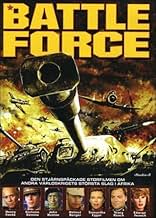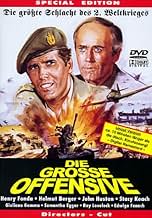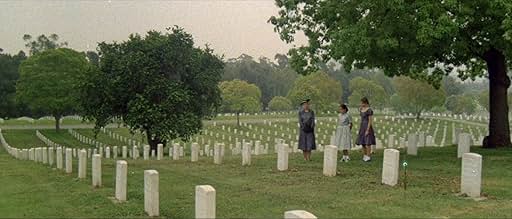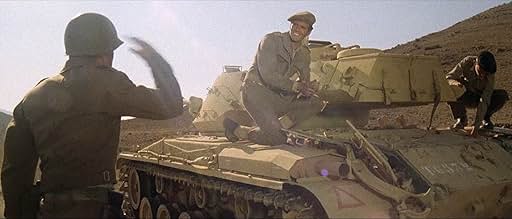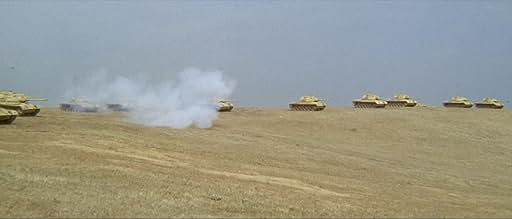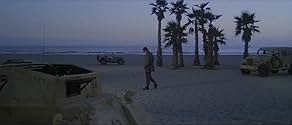AVALIAÇÃO DA IMDb
4,7/10
631
SUA AVALIAÇÃO
Adicionar um enredo no seu idiomaHow World War II affected the lives of a German family and an American family, both of whom had sons and fathers fighting in the war.How World War II affected the lives of a German family and an American family, both of whom had sons and fathers fighting in the war.How World War II affected the lives of a German family and an American family, both of whom had sons and fathers fighting in the war.
- Direção
- Roteiristas
- Artistas
Ida Galli
- Sybil Scott
- (as Evelyn Stewart)
Rik Battaglia
- French Partisan
- (as Rick Battaglia)
Avaliações em destaque
This film has the unmistakable whiff of tax write off about it and I can't believe the non-Italians in this Italian made World War II film weren't doing this one for nothing more than a paycheck and a European vacation.
For an Italian film you would think Italy would be mentioned somewhere in this story. The climax of the movie is the battle for Tunisia where the Italians had a lot of soldiers. The battle scenes are merely stock footage from other and better films.
The only tie in this whole story is a meeting in Berlin of retired army general Henry Fonda, war correspondent John Huston, German-Jewish actress Samantha Eggar and German major Stacy Keach. Meeting at the time of the Olympics there, the four dismiss the possibility of war.
After that it seems like you're watching four or five separate films all at once. Everyone seems to be just reciting the dialog by rote and hurrying off to do better things presumably. Even Orson Welles who narrates the English language version, can't whip up any excitement in his voice.
It's just another one done for the money.
For an Italian film you would think Italy would be mentioned somewhere in this story. The climax of the movie is the battle for Tunisia where the Italians had a lot of soldiers. The battle scenes are merely stock footage from other and better films.
The only tie in this whole story is a meeting in Berlin of retired army general Henry Fonda, war correspondent John Huston, German-Jewish actress Samantha Eggar and German major Stacy Keach. Meeting at the time of the Olympics there, the four dismiss the possibility of war.
After that it seems like you're watching four or five separate films all at once. Everyone seems to be just reciting the dialog by rote and hurrying off to do better things presumably. Even Orson Welles who narrates the English language version, can't whip up any excitement in his voice.
It's just another one done for the money.
Shot in 1978, during a decade saturated with revisionist interpretations and international co-productions, this film offers a compelling-if at times uneven-exercise in ensemble war storytelling. Situated within the well-worn terrain of the Second World War's European theater, the movie positions itself among those sprawling, multithreaded narratives that attempt to span not only geographical borders but ideological ones as well. The context of its production is essential: the late '70s saw Italy-and much of Europe-grappling with political turbulence, post-1968 disillusionment, and a cinematic shift toward more ambivalent portrayals of heroism. In this light, the film's ideological subtext oscillates between a residual admiration for wartime sacrifice and a growing skepticism about military valor as pure virtue, a tension which is perceptible both in its mise-en-scène and in its performance style.
Cinematically, the movie is ambitious but occasionally overstretches its reach. Its use of Panavision widescreen is effective, especially in the battle scenes and troop movements, which are clearly influenced by the visual grammar of American epics such as A Bridge Too Far (1977). Yet while that film benefited from a cohesive aesthetic and a consistent tone, this one seems torn between dramatic gravitas and exploitation-film spectacle. The lighting in interior scenes often veers into soap-operatic territory, with overly diffused sources flattening what should be moments of claustrophobia or moral tension. Exteriors fare better: winter settings are appropriately grim, and the muddy palettes, likely informed by the Italian neorealist residue still lingering in European cinematography, create an effective contrast with the more glamorized combat scenes.
The editing style is indicative of its time, favoring rapid intercutting that sometimes undermines narrative clarity. This is especially evident in the crosscutting between parallel plotlines, which appear to compete rather than complement each other. The result is a certain dissonance in pacing-moments of reflection are too often interrupted by sequences that feel included for spectacle's sake rather than narrative necessity. This narrative fragmentation mirrors to some extent the thematic pluralism of the film, but it comes at a cost: emotional investment is scattered, and the film never quite manages to fully inhabit any one of its many story arcs.
Performance-wise, the ensemble cast reflects the Euro-American co-production strategy typical of the period. While some of the actors bring a credible pathos to their roles-particularly those portraying rank-and-file soldiers caught in the grind of orders and ideology-others seem to be playing archetypes rather than characters, delivering their lines with a theatricality more suited to dubbed television dramas than war cinema. This disjointedness in acting styles-possibly due to linguistic and cultural differences among the cast-adds another layer of fragmentation to the viewing experience. Nevertheless, in moments of silence or shared glances, the film achieves a kind of understated poignancy rarely found in more bombastic entries of the genre.
The score, though derivative, provides a steady undercurrent that ties together the disparate narrative threads. It leans heavily on brass and martial motifs, occasionally lapsing into over-sentimentality, especially during scenes of sacrifice or reunion. Still, it functions adequately within the genre's expectations. In comparison with The Eagle Has Landed (1976), which also juggles espionage, infiltration, and multinational perspectives, this film is less taut in structure but more visually expressive, even if that expression often borders on melodrama.
Thematically, the movie straddles several registers: it wants to condemn the machinery of war while simultaneously indulging in its aesthetics. This contradiction reflects the sociopolitical moment of its production, when audiences were both weary of grand narratives and nostalgic for collective struggle. Its antiwar gestures-though present-are undermined by its reliance on spectacle and its occasional descent into near-pulp portrayals of violence. Unlike Cross of Iron (1977), which maintained a consistent tone of moral ambiguity and psychological depth, this film struggles to reconcile its stylistic bravado with the gravity of its subject matter.
The film's most effective sequences are those that slow down and allow for the materiality of war to be felt: the weight of uniforms soaked in blood and mud, the tactile despair of soldiers sleeping in trenches, the silence after an artillery barrage. In those moments, the film edges closer to the kind of micro-historical sensibility found in Stalingrad (1993), albeit lacking its single-minded focus. But such instances are fleeting. Too often, the film returns to its panoramic scope, sacrificing intimacy for narrative sprawl.
Technically, the use of practical effects and pyrotechnics is commendable, especially given the limited budget typical of European co-productions at the time. These sequences, while less polished than those of contemporaneous American productions, possess a rawness that suits the film's more grounded aspirations. The sound design, however, occasionally fails to match the intensity of the visuals-explosions are muffled or mistimed, and the mix tends to flatten battlefield acoustics rather than accentuate their chaos.
As a product of its time, this movie reveals much about the shifting cultural memory of the Second World War in 1970s Europe. It attempts to be many things-a tapestry of wartime experiences, a critique of militarism, an action vehicle, and a meditative homage-and in trying to balance these aims, it falters as often as it succeeds. Yet its ambition and its willingness to foreground European perspectives on an often Anglo-American dominated genre render it a valuable, if flawed, entry in the corpus of World War II cinema.
Cinematically, the movie is ambitious but occasionally overstretches its reach. Its use of Panavision widescreen is effective, especially in the battle scenes and troop movements, which are clearly influenced by the visual grammar of American epics such as A Bridge Too Far (1977). Yet while that film benefited from a cohesive aesthetic and a consistent tone, this one seems torn between dramatic gravitas and exploitation-film spectacle. The lighting in interior scenes often veers into soap-operatic territory, with overly diffused sources flattening what should be moments of claustrophobia or moral tension. Exteriors fare better: winter settings are appropriately grim, and the muddy palettes, likely informed by the Italian neorealist residue still lingering in European cinematography, create an effective contrast with the more glamorized combat scenes.
The editing style is indicative of its time, favoring rapid intercutting that sometimes undermines narrative clarity. This is especially evident in the crosscutting between parallel plotlines, which appear to compete rather than complement each other. The result is a certain dissonance in pacing-moments of reflection are too often interrupted by sequences that feel included for spectacle's sake rather than narrative necessity. This narrative fragmentation mirrors to some extent the thematic pluralism of the film, but it comes at a cost: emotional investment is scattered, and the film never quite manages to fully inhabit any one of its many story arcs.
Performance-wise, the ensemble cast reflects the Euro-American co-production strategy typical of the period. While some of the actors bring a credible pathos to their roles-particularly those portraying rank-and-file soldiers caught in the grind of orders and ideology-others seem to be playing archetypes rather than characters, delivering their lines with a theatricality more suited to dubbed television dramas than war cinema. This disjointedness in acting styles-possibly due to linguistic and cultural differences among the cast-adds another layer of fragmentation to the viewing experience. Nevertheless, in moments of silence or shared glances, the film achieves a kind of understated poignancy rarely found in more bombastic entries of the genre.
The score, though derivative, provides a steady undercurrent that ties together the disparate narrative threads. It leans heavily on brass and martial motifs, occasionally lapsing into over-sentimentality, especially during scenes of sacrifice or reunion. Still, it functions adequately within the genre's expectations. In comparison with The Eagle Has Landed (1976), which also juggles espionage, infiltration, and multinational perspectives, this film is less taut in structure but more visually expressive, even if that expression often borders on melodrama.
Thematically, the movie straddles several registers: it wants to condemn the machinery of war while simultaneously indulging in its aesthetics. This contradiction reflects the sociopolitical moment of its production, when audiences were both weary of grand narratives and nostalgic for collective struggle. Its antiwar gestures-though present-are undermined by its reliance on spectacle and its occasional descent into near-pulp portrayals of violence. Unlike Cross of Iron (1977), which maintained a consistent tone of moral ambiguity and psychological depth, this film struggles to reconcile its stylistic bravado with the gravity of its subject matter.
The film's most effective sequences are those that slow down and allow for the materiality of war to be felt: the weight of uniforms soaked in blood and mud, the tactile despair of soldiers sleeping in trenches, the silence after an artillery barrage. In those moments, the film edges closer to the kind of micro-historical sensibility found in Stalingrad (1993), albeit lacking its single-minded focus. But such instances are fleeting. Too often, the film returns to its panoramic scope, sacrificing intimacy for narrative sprawl.
Technically, the use of practical effects and pyrotechnics is commendable, especially given the limited budget typical of European co-productions at the time. These sequences, while less polished than those of contemporaneous American productions, possess a rawness that suits the film's more grounded aspirations. The sound design, however, occasionally fails to match the intensity of the visuals-explosions are muffled or mistimed, and the mix tends to flatten battlefield acoustics rather than accentuate their chaos.
As a product of its time, this movie reveals much about the shifting cultural memory of the Second World War in 1970s Europe. It attempts to be many things-a tapestry of wartime experiences, a critique of militarism, an action vehicle, and a meditative homage-and in trying to balance these aims, it falters as often as it succeeds. Yet its ambition and its willingness to foreground European perspectives on an often Anglo-American dominated genre render it a valuable, if flawed, entry in the corpus of World War II cinema.
4emm
For a low-budget movie set during World War II, it does have a rough and violent edge. Above all, BATTLE FORCE surrenders to a non-existent plot and storyline that's been duped hundreds of times repeatedly. Don't expect much here as there's no specific meaning. Explosions and body counts are nothing new! Adding to the troop casulty count is of Orson Welles' annoying and interrupting narration, making it feel like a made-for-television documentary. War movies are instant classics in the grade "A" Hollywood circuit, and SAVING PRIVATE RYAN triumphs realism today. Despite a fairly good replica of those WW2 days, BATTLE FORCE is another run-of-the-mill production without enough substance. Anyone who grew up watching Hollywood war dramas in their lifetimes probably avoided this one while history was made.
I'm not a fan of war films to say the least and if I'm going to sit down and watch one, there generally has to be a real good reason for doing so. Despite the fact that Battle Force is a largely unknown and inconsequential war film from the late seventies; I actually did have several good reasons for seeing it. Anything directed by Umberto Lenzi is automatically worth watching considering all the great cult films he has delivered; from some of the best Giallo's to the very best of the Polizi genre, and adding to that is absolutely mouth-watering cast. However, in spite of those things; this is still a highly disappointing and really rather rubbish movie. The plot is rather confusing and doesn't make much sense and mainly focuses on two families of different nationalities during World War Two. However, we also focus on the actual war itself and various battles that the characters are involved in and this all gets mingled in with the stories of the families...
The main problem with this film is that it tries to do too much and the one hundred minute running time is simply not long enough for it to do it all in (although I am thankful that the film didn't last for longer!). I don't really know how credible Umberto Lenzi was as a director in 1978 (probably more credible than he was in the eighties), but somehow he has managed to get his hands on a magnificent cast chequered with stars - and not just cult stars! Big names such as John Huston, Henry Fonda and Orson Welles have roles alongside cult stars such as Ray Lovelock, Samantha Eggar, Evelyn Stewart, Stacy Keach, Helmut Berger and Edwige Fenech (who really doesn't appear for long enough). This cast is all well and good but unfortunately it's wasted. The plot lacks any sort of direction and the film might actually have been better as an anthology style movie with a few different but focused stories. The war scenes look extremely cheap (the budget was probably spent on paying stars' wages) and that also brings the film down, although there is plenty of action. Overall, this did actually have the potential to be a masterpiece; but to say the least, it isn't! Recommended for its cult value only.
The main problem with this film is that it tries to do too much and the one hundred minute running time is simply not long enough for it to do it all in (although I am thankful that the film didn't last for longer!). I don't really know how credible Umberto Lenzi was as a director in 1978 (probably more credible than he was in the eighties), but somehow he has managed to get his hands on a magnificent cast chequered with stars - and not just cult stars! Big names such as John Huston, Henry Fonda and Orson Welles have roles alongside cult stars such as Ray Lovelock, Samantha Eggar, Evelyn Stewart, Stacy Keach, Helmut Berger and Edwige Fenech (who really doesn't appear for long enough). This cast is all well and good but unfortunately it's wasted. The plot lacks any sort of direction and the film might actually have been better as an anthology style movie with a few different but focused stories. The war scenes look extremely cheap (the budget was probably spent on paying stars' wages) and that also brings the film down, although there is plenty of action. Overall, this did actually have the potential to be a masterpiece; but to say the least, it isn't! Recommended for its cult value only.
The Biggest Battle (1978)
* 1/2 (out of 4)
Incredibly disappointing drama starts off in Germany during the 1936 Olympics where an American general (Henry Fonda), a German major (Stacy Keach), a Jewish actress (Samantha Eggar) and a war correspondent (John Huston) are having dinner and agreeing that Hitler will not cause a war. Flash forward to 1942 and war is happening and all sides of this dinner are now in the middle.
THE BIGGEST BATTLE is an Italian and West German co-production that was meant to rival various American movies that took on the WWII subject. Of course something like MIDWAY was an obvious inspiration. The most interesting thing about this film is that it did have a bigger budget than you'd normally see in a film like this but the problem is that the budget wasn't big enough. It's clear that writer-director Umberto Lenzi wanted to make an epic war film and even got a terrific cast together but the film falls well short of that.
There's no question that the biggest problem with this film is its screenplay. I never found any of these characters to be interesting and especially the Keach character. I found the character to be extremely bland but so was another subplot that deals with Fonda and his two sons going off to fight in the war. The "proud father" aspect just doesn't work. There's really nothing story wise that connects with the viewer and this incldues the action. There are a lot of action scenes but they just feel cheap and never contain any tension.
With all of that being said, the most amazing thing about this picture is the fact that they got such a great cast. You've got Fonda, Keach, Huston and Eggar but there's also Helmut Berger, Edwige Fenech, Ray Lovelock and various other foreign actors. You've also got Orson Welles doing the narration in some versions but the version I watched didn't feature that. The story was confusing as it was so perhaps his narration was used to make more sense out of the film?
THE BIGGEST BATTLE is a pretty poor film but the worst thing is the fact that it's really disappointing considering the cast.
* 1/2 (out of 4)
Incredibly disappointing drama starts off in Germany during the 1936 Olympics where an American general (Henry Fonda), a German major (Stacy Keach), a Jewish actress (Samantha Eggar) and a war correspondent (John Huston) are having dinner and agreeing that Hitler will not cause a war. Flash forward to 1942 and war is happening and all sides of this dinner are now in the middle.
THE BIGGEST BATTLE is an Italian and West German co-production that was meant to rival various American movies that took on the WWII subject. Of course something like MIDWAY was an obvious inspiration. The most interesting thing about this film is that it did have a bigger budget than you'd normally see in a film like this but the problem is that the budget wasn't big enough. It's clear that writer-director Umberto Lenzi wanted to make an epic war film and even got a terrific cast together but the film falls well short of that.
There's no question that the biggest problem with this film is its screenplay. I never found any of these characters to be interesting and especially the Keach character. I found the character to be extremely bland but so was another subplot that deals with Fonda and his two sons going off to fight in the war. The "proud father" aspect just doesn't work. There's really nothing story wise that connects with the viewer and this incldues the action. There are a lot of action scenes but they just feel cheap and never contain any tension.
With all of that being said, the most amazing thing about this picture is the fact that they got such a great cast. You've got Fonda, Keach, Huston and Eggar but there's also Helmut Berger, Edwige Fenech, Ray Lovelock and various other foreign actors. You've also got Orson Welles doing the narration in some versions but the version I watched didn't feature that. The story was confusing as it was so perhaps his narration was used to make more sense out of the film?
THE BIGGEST BATTLE is a pretty poor film but the worst thing is the fact that it's really disappointing considering the cast.
Você sabia?
- Erros de gravaçãoIn one of the scenes the American Flag has fifty stars, as it does now, but that flag was not adopted until Monday, July 4, 1960. The flag that should have been shown, which the Americans during World War Two served under, was the forty eight-star Stars and Stripes, which was valid from Thursday July 4, 1912 to Friday July 3, 1959, and is even seen hanging high in Grand Central Station in Hitchcock's North by Northwest.
- Citações
German in Danielle's room: A French whore should work with her hips and not her lips!
- Versões alternativasThe American release has been dubbed into English. The titles have been translated to English. However, on the Direct Source Special Products Home Video Release, the film remains dubbed in English, yet the opening and ending titles have been redone using modern computer technology. The opening features the title BATTLE FORCE, and credits the film's director Humphrey Longan as Humphrey Logan; credits actress Edwige Fenech as Edwige French; and claims the cast listing to be in alphabetical order, which it is not.
- ConexõesEdited from A Legião Dos Malditos (1969)
Principais escolhas
Faça login para avaliar e ver a lista de recomendações personalizadas
- How long is The Biggest Battle?Fornecido pela Alexa
Detalhes
- Data de lançamento
- Países de origem
- Idiomas
- Também conhecido como
- The Biggest Battle
- Locações de filme
- Veneza, Califórnia, EUA(beach scenes)
- Empresas de produção
- Consulte mais créditos da empresa na IMDbPro
Contribua para esta página
Sugerir uma alteração ou adicionar conteúdo ausente

